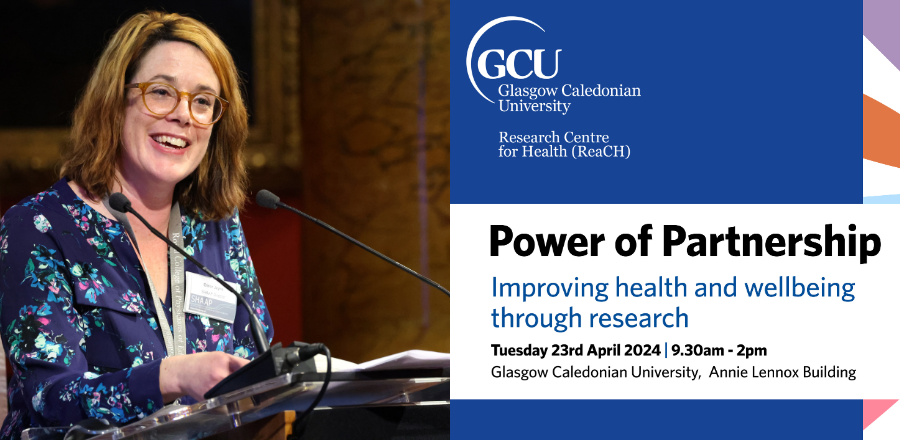High-profile partner to demonstrate the Power of Partnership at event

Scottish Health Action on Alcohol Problems (SHAAP) Director Elinor Jayne will show how amazing things can happen by joining forces with Glasgow Caledonian University at the Research Centre for Health (ReaCH) ‘Power of Partnership’ event on Tuesday, April 23.
The free event will be held in Glasgow Caledonian University's Annie Lennox Building from 9.30am-12.45pm, followed by a networking lunch. Register here through Eventbrite.
SHAAP provides the authoritative medical and clinical voice on the need to reduce the impact of alcohol-related harm on the health and wellbeing of people in Scotland, and the evidence-based approaches to achieve this.
The organisation is a partnership of the Medical Royal Colleges in Scotland and the Faculty of Public Health, and is based at the Royal College of Physicians of Edinburgh. It has been a key ReaCH partner for the past decade, working closely with ReaCH Co-Director Professor Carol Emslie and her Substance Use Research Group.
Elinor will explain to the audience at the ‘Power of Partnership - Improving health and wellbeing through research’ event why collaborating with ReaCH has been instrumental to improving lives and changing policy in Scotland.
Elinor said: “Working with Carol and her team at Glasgow Caledonian University has been hugely effective in making people sit up and listen.
“The research that the team carried out on the experiences of LGBTQ+ people of alcohol services, building on past research, really shone a light on what needs to change in order for services to more adequately meet the needs of LGBTQ+ people.
“Indeed, after highlighting the research findings to politicians, public health officials and government officials, we’ve now seen the UK government refer to the research and the need to act on it in its recently published Alcohol Treatment Guidance.
“SHAAP wants to see harms caused by alcohol reduced, particularly amongst people and communities who are likely to suffer from health and social inequalities. That’s why collaborating with the University has been so valuable, as the research that has been carried out, and our work with the researchers to translate this into change in policy and on the ground, has actually had an impact. “
Professor Emslie and fellow ReaCH Co-Director Professor Frederike van Wijck are delighted that Elinor agreed to give a plenary talk at the event.
Professor Emslie said: “The partnership between SHAAP and ReaCH perfectly illustrates the expertise of our third-sector partners in helping us translate research into action.
“Working with SHAAP has helped us raise awareness of health inequalities for LGBTQ+ people, and present our findings at the Scottish Parliament. Our research about the need to tailor alcohol services for LGBTQ+ people was also highlighted in the consultation on new UK treatment guidelines.”
The audience will also be treated series of interactive workshops from some of the Centre's world-leading researchers showcasing how research is already changing and improving lives through the power of partnership.
These include: ‘Are you being served? How are GCU working with and for LGBTQIA+ communities in Scotland and Beyond?’ with Professor Jamie Frankis; ‘Overdose prevention using take-home naloxone - everyone's business’ with Professor Andrew McAuley and Mariebeth Kilbride, from Scottish Drugs Forum; ‘Functional Fitness MOTs’ with Professor Dawn Skelton and Professor Katrina Bannigan; ‘Meet your pelvic floor: where is it and what does it do?’ with Professor Suzanne Hagen; ‘Grin and bear it: understanding living with leg pain and arterial disease and why walking is so important’ with Dr Chris Seenan and Cathy Gormal, who lives with the disease; and ‘Get involved! Patient and public involvement and engagement in research’ with Professor Alex Todhunter-Brown.
Through this unique power of partnership, the University has gained a global reputation as a leader in health research that results in tangible improvements to people's lives at home and abroad.
An impressive 91% of research carried out by the ReaCH team and all of its impact has been formally classified as world-leading or internationally excellent in the latest UK-wide Research Excellence Framework assessment (REF).
